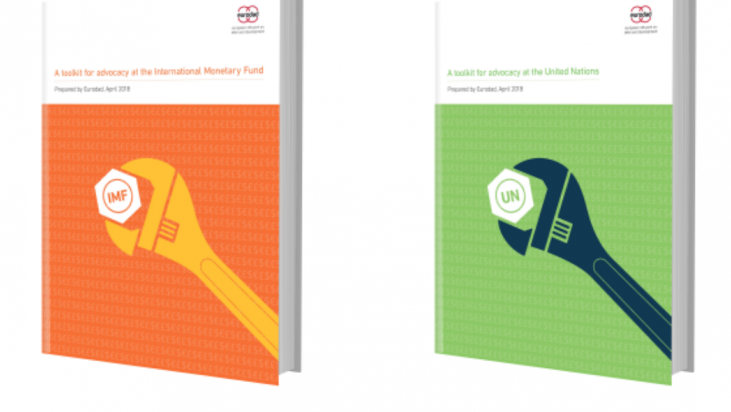Eurodad, the European Network on Debt and Development, just published two advocacy toolkits “for any organisation that wants to begin or step up its advocacy towards the International Monetary Fund (IMF) or UN (United Nations)”:
As the ECOSOC Forum on Financing for Development follow-up (FfD Forum) will convene at the UN in New York on Monday, for the whole week, CSOs can make good use of Eurodad’s toolkit for advocacy at the United Nations.
“The United Nations (UN) is a highly complex organization, Eurodad explains. It can be difficult for civil society advocates to know where to start and the best way to exert any influence. This toolkit will help civil society organisations (CSOs) and other stakeholders to navigate the politics and structure of the UN system and its main decision-making bodies. It will also provide a roadmap to help guide CSOs through the main types of UN agreements and how they are negotiated, with a focus on financing for development and global economic governance, in particular relating to debt issues.
The UN Member States hold most of the formal rights when it comes to participation in UN decision-making. However, CSOs do have some rights to participate formally in UN processes, and there are possibilities for influencing these processes informally. Moreover, they can influence their national government’s position both at the UN and at home.
The toolkit modules explain the main advocacy options and provide useful information for CSOs wanting to influence the UN as a key body to create greater financial justice”.
Eurodad also published a toolkit for advocacy at the International Monetary Fund.
“The toolkit, Eurodad introduces, is principally targeted at CSOs based in the EU, and those working on development finance issues within the context of the 2030 Agenda for Sustainable Development. The IMF is a key part of the international financial architecture and wields huge influence over the domestic economic policies of impoverished countries through its core work.The IMF’s activities impact heavily on a range of issues including, education, health, social protection, tax justice, labour rights, youth unemployment, climate change resilience, and inequality: meaning it directly impacts the enjoyment of human rights across the world.
This toolkit is therefore intended to be an accessible resource for any organisation working on these issues and that wants to begin or step up its advocacy towards the IMF. Given the bearing that the IMF has on how able the Global South will be to finance and achieve the Sustainable Development Goals, it is critical for CSOs to contribute their voices to its work”.
